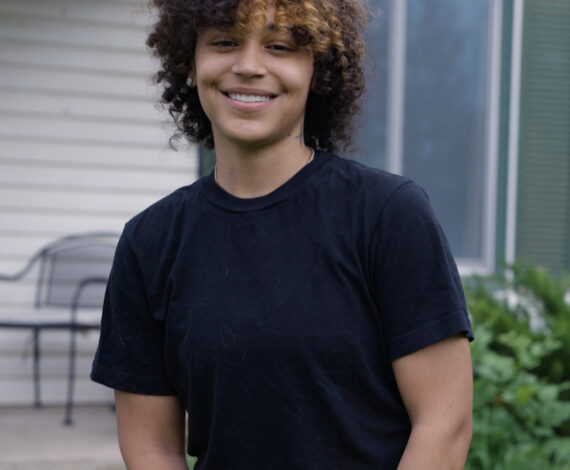
Mudra v. Buffalo Wild Wings:
FOR IMMEDIATE RELEASE
August 12, 2025
CONTACT
Noah Parrish, Communications Director
[email protected]
651.432.0171
Today, Gender Justice filed a charge of discrimination with the Minnesota Department of Human Rights (MDHR) on behalf of a biracial (Black and white) 18-year-old Gerika Mudra, a high school girl who was harassed by a server at Buffalo Wild Wings who accused her of being a boy in the girls’ bathroom.
While dining at the Owatonna location, Mudra was followed into the women’s bathroom by a server who banged on the stall door and demanded she “prove” she was a girl. The employee blocked her from leaving until Mudra unzipped her hoodie to show she had breasts. Only then did the server relent.
“What happened to Gerika Mudra was not just wrong, it was unlawful,” said Sara Jane Baldwin, senior staff attorney at Gender Justice. “Minnesota law protects people from exactly this kind of discrimination in public spaces. No one should be harassed, humiliated, or forced to prove themselves just to use the bathroom.”
Gerika’s experience reflects a broader climate of fear and suspicion aimed at anyone who doesn’t conform to narrow expectations of what girls and women “should” look like. While she is not transgender, the scrutiny and harassment she faced is unfortunately all too familiar to trans and gender expansive people, including masculine presenting queer women.
“This kind of gender policing is, unfortunately, nothing new. And yet, in our current climate we have to ask: What if Gerika had been a trans person?” said Megan Peterson, executive director at Gender Justice. “Would this story have ended differently? That’s the terrifying reality too many trans people live with every day.”
Nearly one-third of LGBTQ+ people report experiencing harassment for using a bathroom. For transgender people, these encounters are even more common and more dangerous. Almost 60% of trans people have avoided using public restrooms out of fear, and of the 930 anti-LGBTQ+ incidents reported in the last year, over half targeted trans and gender nonconforming people.
Black girls and women also face relentless policing of their appearance and identity. In schools, they are suspended at six times the rate of white girls, often for subjective reasons tied to how they dress, speak, or wear their hair. These same biases follow them into places like restaurants and bathrooms where they are often treated as suspicious or out of place for simply being themselves.
“Gerika’s story sits at the intersection of anti-LGBTQ+ panic, racism, and rigid gender norms and stereotypes,” said Peterson. “A growing culture of suspicion and control is targeting trans, gender-nonconforming, and Black girls and women—anyone who doesn’t match narrow ideas of how women should look or behave. When people are harassed just for existing, none of us are truly safe.”
“We know Gerika was targeted because of how she looks,” said Shauna Otterness, Mudra’s stepmom. “She didn’t do anything wrong. She just didn’t fit what that server thought a girl should look like. I was shocked and heartbroken by how many people shared similar stories after I posted about it online. This shouldn’t be normal. We can do better, and we have to.”
By filing with the MDHR, Gender Justice and the Mudra family hope to raise awareness about the agency’s role in protecting Minnesotans from discrimination. At a time when the federal government is actively rolling back civil rights protections for LGBTQ+ people and undermining decades of progress, strong state-level enforcement is more important than ever.
“The Minnesota Human Rights Act is clear: businesses have a legal duty to protect their customers from harassment and discrimination,” said Baldwin. “That means providing staff with training, creating clear policies, and creating a culture that ensures every person is treated with respect and dignity. What happened to Gerika is exactly the kind of harm our laws are meant to prevent, and it’s time businesses take those responsibilities seriously.”
Mudra v. Buffalo Wild Wings: